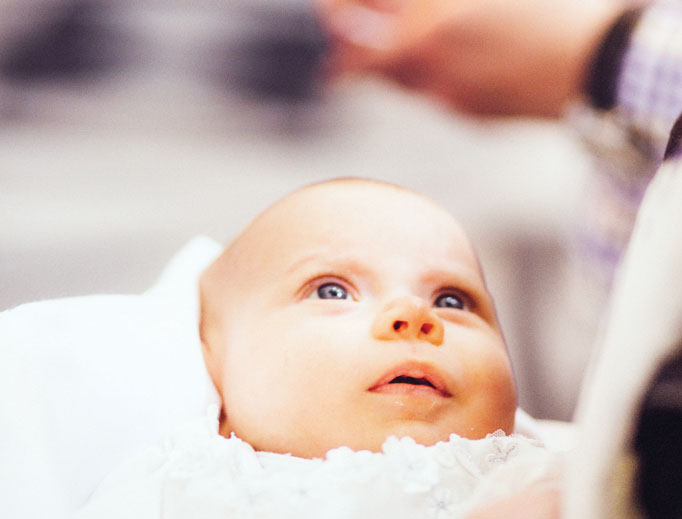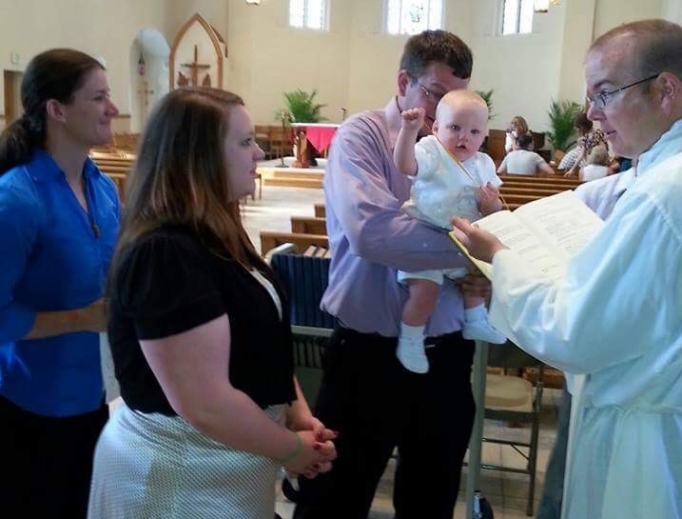Godparents: Faithful Examples to Their Spiritual Children
Feature on blessed supports to a Christian life.

Denice Hinojosa has no children of her own, but she is a spiritual mother to seven.
Ever since Hinojosa, of Fremont, Ohio, became a godmother in 1989 to her niece, Monica Mingus, she has taken to heart the Catechism of the Catholic Church’s directive (1255) that she be a “firm believer” who is “able and ready to help the newly baptized — child or adult — on the road of Christian life.”
For her, being a godmother is clearly more than an honorary title — as the Church intends. When, as a teen and recent convert, she became one, she said, “I knew that I was expected to be a spiritual mother for Monica, especially in her faith, to be there and to help guide her, and I’ve always taken that very seriously.”
Godparents trace their origins to the early Church in which sponsors would vouch for the integrity of candidates for baptism, Eucharist and confirmation and help them prepare for receiving the sacraments and living as Christians. In the case of infant baptism, the sponsor would make a profession of faith for the child and agree to instruct him or her in the faith if needed. The term “godfather” came into use around the year 800, when infant baptism became the norm. It remains today, although, technically, godparents still are considered sponsors.
Canon law requires that a prospective godparent be at least 16 years old, have received the sacraments of Eucharist and confirmation and be leading “a life in harmony with the faith and the role to be undertaken.” The age requirement can be changed by a bishop or waived by a pastor if deemed appropriate.
Father Darrell Roman, pastor of St. Isaac Jogues parish in St. Clair Shores, Michigan, and godfather to his nephew, Nicholas Kopko, said that most prospective godparents he encounters are not aware of what the role involves and often seem surprised to learn that it is more than honorary.
In preparing them, he explains that they are to help their godsons or goddaughters understand and grow in the faith and that they should be living the faith themselves, practicing it not just on Sundays, but daily.
He also asks them to consider whether they are capable of taking on the duties of a godparent and whether they are living the life of a Christian by praying regularly, going to Mass on Sunday and receiving the sacrament of reconciliation. “If I don’t live my faith, how can I try to pass it on to my godchild?” he said. “What I don’t have, I can’t give.”
After hearing this, Father Roman said, at least two godparent candidates have backed out, saying they were not ready because they weren’t living their faith as they should.
In choosing godparents for their first child, Dismas Peter Nicholas, who was baptized May 14, Joseph and Heather Strickland of Front Royal, Virginia, said the practice of the faith, even more than a family connection, was essential. Heather said they looked for those who could model and pass on the faith to Dismas and would be present in his life. Ultimately, the Stricklands chose Heather’s cousin, Blaze Bingham, and Joseph’s sister, Mary Strickland. “Both of them are very strong in their faith and very close to us,” Heather said. “We knew without a doubt that they would be great examples for our baby.”
The Stricklands, graduates of Christendom College in Front Royal, said they each understood the role of godparents when their child was born, thanks to good catechesis and the modeling of their own godparents. In addition, Heather has had the experience of being a godmother herself.
Father Roman tries to explain to new godparents that their job isn’t just to see the godchild baptized and perhaps give him or her a birthday gift each year. “You have to be part of their lives, and you have that responsibility, if the parents are not raising the child in a proper way, of taking him or her to Mass.”
Although his own godson is being raised in a faithful Catholic home, Father Roman has tried to affirm what the boy’s parents are providing by being involved in his life. For example, he and Nicholas have spent time together at the family cottage, celebrating Mass each day, taking walks, saying the Rosary and watching religious movies. They also recently visited the Capuchin monastery in Detroit, where they prayed at the grave of soon-to-be-Blessed Father Solanus Casey.
Similarly, Hinojosa makes a point of regularly calling or texting her godchildren (or their parents, if the children are very young) to say she is thinking of them or praying for them.

She said the messages help her as well because they remind her that her godchildren are looking to her as a spiritual mother. “If I’m not walking the walk and talking the talk, I’m not guiding them in the right way.”
Hinojosa said she thinks many godchildren today want to reach out to their godparents, but struggle with how to do that. “For me, what’s worked is that I initiate. I’m the one who makes that first step to reach out to them — not to push, but just to encourage them and let them know I’m here.”
She said she would advise other godparents to stay in touch with their godchildren, conveying Christ’s love and mercy to them and encouraging them to keep pursuing holiness, particularly if they are struggling. “A godparent needs to know that it is a big role you take on, and if you’re not encouraging your godchildren, it’s easy for them to slip through the cracks, especially if their own biological parents aren’t fulfilling their end of the obligation. You’ve just got to maintain that good, strong contact with them. And keep it Catholic. I’m not ashamed to tell them I prayed the Rosary for them or offered a special intention for them at Mass.”
Even when parents are doing their part, godparents can play an important role in the lives of their godchildren.
Daniel Mattson, who dedicated his recently released book, Why I Don’t Call Myself Gay (Ignatius Press), to his godparents, Robert and Susan Cavera, said, “God used [them] in ways my own parents couldn’t reach out to me.”
Mattson said the Caveras are close family friends who have been involved in his life from the beginning. It was their invitation to a conference of Courage International, an apostolate that ministers to people with same-sex attraction, which led to Mattson’s return to the Catholic Church.
“I don’t think I would have gone if my parents had invited me,” Mattson said. “There was too much baggage in my relationship with my parents. I would have felt that they were going to try to ‘fix’ me ... but with my godparents, there was enough distance that I was more open to that invitation.”
In his book’s dedication, Mattson wrote that the Caveras’ prayers “helped bring me home.”
“It’s a gift from God,” he said, “that we have the godparent relationship.”
Judy Roberts writes from
Graytown, Ohio.
- Keywords:
- godparents
- judy roberts

















